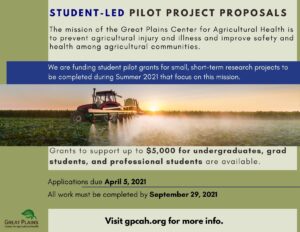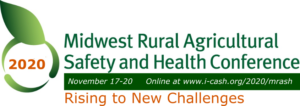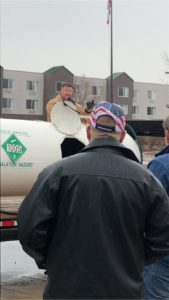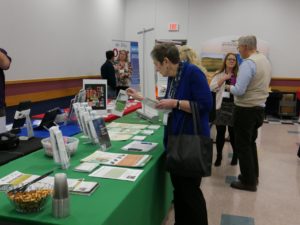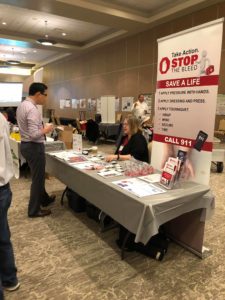Manure Gas Hazards
DID YOU KNOW… Manure gas contains a mixture of hydrogen sulfide (H2S) and methane (CH4), neither of which can be smelled when they are in high concentrations. Inhalation of high concentrations H2S will paralyze your respiratory system, leading to asphyxiation. H2S...GPCAH Pilot Grants
The Center funds pilot projects (up to $30,000 per project) intended to promote innovative outreach and research efforts to prevent agricultural injury and illness. The pilot program supports both community-based organizations and academic researchers, especially new...Student-Led Summer Pilot Grant Program
We are no longer accepting proposals for student-led pilot project proposals at this time.
Questions?
Please contact Russ Foushee, Center Coordinator (herman-foushee@uiowa.edu, 319-335-4405).
GPCAH Mission
The Great Plains Center for Agricultural Health (GPCAH) is a National Institute for Occupational Safety and Health (NIOSH)-funded Center for Agricultural Disease and Injury Research, Education, and Prevention. The GPCAH is dedicated to protecting the health and safety of farmers, ranchers, farmworkers, their families, and agricultural community members in the Midwest and beyond. The goals of the Center are achieved through basic and applied research, education and training, community outreach, and translation of research findings into effective interventions for the prevention of agricultural injury and illness.
The GPCAH is a regional center addressing priority occupational safety and health needs of agricultural workers in IA, IL, IN, KS, MI, MO, MN, ND, NE, OH, SD, and WI.
The purpose of the GPCAH Pilot/Feasibility Projects Program is to serve as an incubator for new agricultural health and safety research, prevention, intervention, community outreach, and translation projects that have high likelihood of leading to more comprehensive projects or activities.
Objective and Scope of this Request for Proposals (RFP)
This RFP seeks applications for small, student-led pilot research projects with a scope of work amenable to be completed and all expenses incurred by September 29, 2021. The total funding request may not exceed $5,000 (including direct and indirect costs, as applicable). All funding is conditional on continued availability of funds allocated by NIOSH to the GPCAH. We anticipate funding up to five projects responsive to this RFP.
Because of the limited funding available per project and the shortened timeline, investigators must carefully consider the feasibility of the proposed scope of wok. Although we will consider all proposals regardless of research type (i.e., basic/etiologic, intervention, translational, or surveillance), the following examples highlight research activities that may be optimally suited for the funding/time constraints of these awards:
- Secondary analyses of an existing dataset, or a combination of existing datasets, to explore a novel agricultural safety and health research question
- Systematic reviews / meta-analyses of occupational health problems in agriculture
- Development and/or validation of innovative methods of assessing agricultural exposures
- Pilot testing of a new agricultural safety and health educational activity or resource
- Benchtop/lab testing of a novel engineering control
Note that responsive applications will have at least one clear scientific objective that fills a justified gap in agricultural safety and health knowledge.
Applications are due by close of business on Monday, April 5, 2021.
Eligibility
Any student with an interest in agricultural safety or health and appropriate knowledge, skills, and resources to carry out the proposed project is invited to prepare an application. For the purposes of this RFP, “student” is defined as a person enrolled in an institution of higher education (public or private, non-profit or for-profit) with the objective of obtaining an academic or professional degree. Undergraduate students, graduate students, and professional students (including those in colleges of medicine, dentistry, nursing, law, pharmacy, and veterinary medicine) are eligible. Each student principal investigator must identify a faculty sponsor, and a letter of support from the faculty sponsor must be included with the application.
Individuals from under-represented groups as well as individuals with disabilities are especially encouraged to apply. Applications from individuals affiliated with institutions within the GPCAH service region will receive priority. Applications from individuals affiliated with institutions outside the GPCAH service region will be considered, but at a lower priority.
Funding
Funding is available for the usual categories of NIH grant direct costs including personnel salary and fringe, supplies, equipment, data analysis activities, office expenses, and travel necessary for project completion (travel to trade, scientific/technical, or professional association meetings is not allowable).
The maximum permitted budget for a project is limited to $5,000, including direct and indirect costs.
Investigators affiliated with the University of Iowa should not include indirect costs in their budgets. Investigators affiliated with institutions other than the University of Iowa are permitted to include indirect costs in their budgets. However, investigators should carefully consider the impact of indirect costs on the scope of work proposed, and may wish to discuss with their institution officials the indirect cost rate that will be applied.
All requested expenses must be fully justified and tied directly to the project. Additional information and justification should be provided within the budget justification for select items of cost, including:
- Technological/IT equipment (e.g., laptops, iPads, Fitbits, and the like): must be project-specific, fully justified, directly allocable to the project, and necessary for completion of the scientific objective(s)
- Software or software licenses: must be project-specific and necessary for completion of the scientific objective(s)
- Research-related food/meals: must be directly related to completion of the scientific objective(s); food for meetings/conferences is not allowable
Review Process
Applications will be evaluated by a review panel of experts both internal and external to the GPCAH. Reviewers will consider priorities expressed in the “Priorities” section of CDC NIOSH PAR-11-022 (http://grants.nih.gov/grants/guide/pa-files/PAR-11-022.html). Each principal investigator of an application deemed responsive to this RFP will receive a written critique, regardless of funding decision.
Awards
Proposal reviews will be completed and applicants will be notified of funding status on or before May 5, 2021. Projects must be completed and all expenses incurred by September 29, 2021.
The release of funds to applicant organizations is contingent upon compliance with federal regulations. Investigators conducting research involving humans and/or animal subjects are encouraged to initiate any applicable human subjects (IRB) or animal care review approval or certification processes as soon as possible. Documentation of IRB approval or a determination from an IRB that the project is does not meet criteria for human subjects research must be submitted to the GPCAH before funds can be released. If you have questions regarding whether a project requires IRB approval, please contact H. Russ Foushee, Center Coordinator (herman-foushee@uiowa.edu, 319-335-4405).
Reporting Requirements
The student principal investigator of each funded project will be required to provide a brief, written final project report within 90 days of project completion. The GPCAH will provide specific instructions regarding the required content of the final project report.
The faculty advisor of each funded project will be required to respond to a brief “impact survey” each year for 2-3 years following completion of the project. The impact survey will ask about (1) the career path of the student principal investigator, (2) presentations/publications resulting from the project since submission of the final project report, and (3) any follow-up on scholarly activity resulting from the project (e.g., new student research activities related to the project, new grants/contracts that the results supported).
Publications, journal articles, presentations, theses and dissertations, and similar works relating to GPCAH-supported pilot projects are required to include the following statement: “This [publication, journal article, presentation, etc.] was supported, in part, by grant number U54 OH007548 from CDC-NIOSH. Its contents are solely the responsibility of the authors and do not necessarily represent the views of the CDC, NIOSH, or the Great Plains Center for Agricultural Health.”
Application Submission Procedure
Send by electronic mail one copy of both the signed cover letter and one complete PDF version of the full proposal to herman-foushee@uiowa.edu. When submitting your application, you must:
- Include the phrase “GPCAH Student Pilot Grant Submission” in the subject line of the pilot grant proposal submission email.
- Check for a confirmation email from the Pilot Project Coordinator to ensure receipt of your email. If this does not happen within a week, call the Pilot Project Coordinator, Russ Foushee, at 319-335-4405.YOUR APPLICATION HAS NOT BEEN RECEIVED IF YOU DO NOT GET A CONFIRMATION EMAIL.
- Ensure that your application was received by GPCAH staff by the close of business on Monday, April 5th, 2021. Confirmation emails from the Project Coordinator may occur after this due date.
Additional Assistance
Applicants are encouraged to contact H. Russ Foushee, Center Coordinator (herman-foushee@uiowa.edu, 319-335-4405) or Nate Fethke, GPCAH Pilot/Feasibility Projects Program Director, (nathan-fethke@uiowa.edu, 319-467-4563) with questions.
| Required Application Content | Page Limits | |
| 1) Cover letter Include project title Signed by an appropriate official and written on organization letterhead Include 1-2 sentences about the project’s potential impact |
1 | |
| 2) Front page Date, title, investigator/organization name(s), and abstract (150 word limit)By submitting this proposal, you agree to the following (which must appear on the front page of your application): This pilot grant application is not currently under review by any other grant administering program. If I submit this pilot grant application (or an application with similar aims) to another funder while it is under review by GPCAH, I will notify GPCAH. I understand that failure to comply with this policy is grounds for rejection of the application and withdrawal of any funds that may be awarded. |
1 | |
| 3) Research Plan |
The Research Plan should address the following: A) What is(are) the specific aim(s) and hypothesis(es) B) Briefly describe the Significance and Innovation of the project C) Briefly describe the Approach (include information about data sources and/or data collection procedures, independent and dependent variables, and anticipated analytic procedures) D) Briefly describe the expected outputs of the project (i.e., what will be the scientific deliverables?) |
3 |
|
The Significance section must · Establish the burden of the agricultural safety and health problem to be addressed, the need for the proposed research, and the potential impact of the research. See: https://www.cdc.gov/niosh/programs/bni.html · Identify specific NIOSH strategic priorities for extramural research and/or specific goals/objectives within the National Occupational Research Agendas for Agriculture, Forestry and Fishing to be addressed. See: https://www.cdc.gov/nora/councils/agff/research.html |
||
| 4) References | No page limit | |
| 5) Budget and budget justification | No page limit | |
| 6) Timeline and milestones | 1 | |
| 7) Planned enrollment table (for projects involving human subjects research) | Required table | |
| 8) Biographical sketches (NIH format) | 5 (per person) | |
|
9) Letter(s) of support Letters of support are useful to demonstrate access to an employer/employee population or dataset needed for success of the research. A letter of support from the faculty sponsor is required. |
No page limit | |
Virtual conference is taking Midwest farm safety to the world
Publish Date: October 14, 2020
Suggested headline: Virtual conference is taking Midwest farm safety to the world
Subhead/Introductory paragraph (displayed in large text on the site):
This year’s Midwest Rural Agricultural Safety and Health (MRASH) Conference is pushing back on the hardships of 2020 by “Rising to New Challenges.” The four-day virtual event (November 17-20) includes live-streaming presentations from agricultural health and safety experts. We will focus on recent challenges and important risks that persist from normal farming operations. Individuals, researchers, and students from all over the world interested in farm safety and health information are invited to visit www.i-cash.org/2020-mrash to register for this event. Registration for all four days is $50, but students, farmers, health care workers, and vocational-agriculture teachers may request a code to register for free. Registration includes the live-streaming and access to pre-recorded presentations. The virtual conference will devote time to poster presentations where you can talk to the authors. The conference will also host an online expo to talk to vendors and advocacy organizations. We have worked yoga breaks into the agenda to minimize Zoom overload.
Credits:
Produced by the Great Plains Center for Agricultural Health
Story: Jenn Patterson, Communications Coordinator (jennifer-j-patterson@uiowa.edu; 319-594-2704)
Photography: Jenn Patterson
Body copy:
“MRASH gets better every year, and we are looking forward to this year’s virtual conference. We have taken the best features from many virtual conferences our team has participated in this year to take advantage of the interactive nature of this medium. We look forward to spreading the MRASH conference out over four mornings in November,” said Renée Anthony, director of the Great Plains Center for Agricultural Health (GPCAH). The GPCAH is co-sponsoring MRASH along with Iowa’s Center for Agricultural Safety and Health. “This year’s agenda brings together experts on diverse topics to discuss how to protect workers from a broad range of risks factors that farmers face.”
Ali S. Khan, MD, MPH, MBA, Dean of the College of Public Health at the University of Nebraska Medical Center and former Assistant Surgeon General, will be the set the tone for MRASH with, “Emerging Zoonotic Diseases Impacting Agriculture: What Comes After COVID-19?”
Panel presenters are excited to share information with MRASH participants on how they have been able to continue effective and safe outreach to agricultural workers, their families, and communities during the COVID-19 pandemic, according to University of Nebraska’s CS-CASH program director, Ellen Duysen. “Many innovative training and education methods have been successfully employed along with a lot of lessons learned,” she said.
University of Iowa Professor of Community and Behavioral Health Rima Afifi, PhD, will pull together the conference with her capstone presentation entitled, “The Science of Communicating Effectively for Behavior Change.” This talk combines practical lessons from Dr. Afifi’s behavioral health research and practice that intersects mental health, refugee and immigrant wellbeing, tobacco control, and intervention evaluation.
The MRASH planning committee hopes that this online format makes it easier for those interested in farmer health and safety to attend. Last year’s two-day meeting in Marshalltown had 112 in attendance. Since we are going virtual, we have opened up free registration for students, farmers, and health care workers to bring additional safety and health advocates into the discussion. “Building a strong network is such an important part of what MRASH does. We are working hard to find new and creative ways to do that online this year,” said Gayle Olson, Assistant to the Director of Iowa’s Center for Agricultural Safety and Health.
Visit www.i-cash.org/2020-mrash to register for the event, strengthen your network, and join in MRASH’s effort to “Rise to New Challenges”. Follow GPCAH on Facebook and Twitter for updates.
Captions:
Event logo
Ammonia safety demonstration, MRASH 2018
Health and safety resources exhibition, MRASH 2019
Iowa Public Health Dept. exhibit, MRASH 2018
Potential pull quote(s):
“Building a strong network is such an important part of what MRASH does, and we are working hard to find new and creative ways to do that online this year,” said Gayle Olson, Assistant to the Director of Iowa’s Center for Agricultural Safety and Health.
Callout(s):
MRASH Conference
In 1990, the Iowa State Legislature identified a need for a statewide center addressing concerns in agricultural safety and health. Iowa’s Center for Agricultural Safety and Health came out of that legislative session and continues to be one of the only mandated, state-funded centers for agricultural safety and health in the country.
Designated as a collaborative effort between four Iowa institutions: The University of Iowa, Iowa State University, the Iowa Department of Public Health and the Iowa Department of Agriculture and Land Stewardship, I-CASH works to improve the health and safety of the agricultural population by developing statewide prevention and educational initiatives.
Although there have been many structural and technological changes in Iowa’s agriculture, farm-related injuries and fatalities remain higher than those in other industries. https://icash.public-health.uiowa.edu/about-us/
Share with:
Public Health, Farmers, Farm Bureau, Extension, Ag-related media (written, news, and radio); State Rural Health Associations; Mental Health advocacy networks; community college networks

